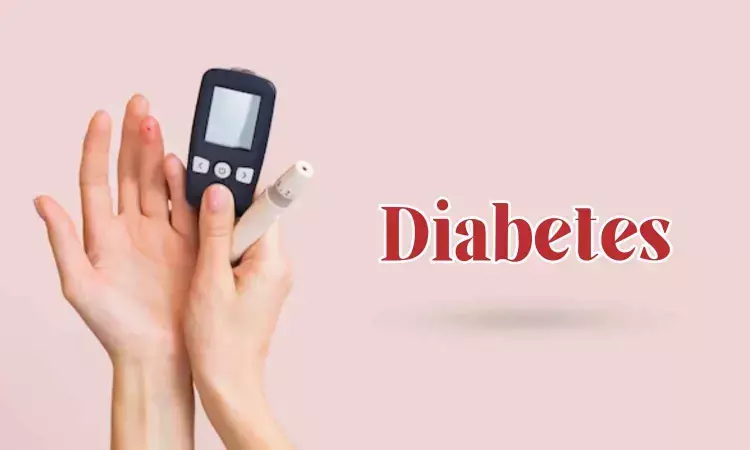- Home
- Medical news & Guidelines
- Anesthesiology
- Cardiology and CTVS
- Critical Care
- Dentistry
- Dermatology
- Diabetes and Endocrinology
- ENT
- Gastroenterology
- Medicine
- Nephrology
- Neurology
- Obstretics-Gynaecology
- Oncology
- Ophthalmology
- Orthopaedics
- Pediatrics-Neonatology
- Psychiatry
- Pulmonology
- Radiology
- Surgery
- Urology
- Laboratory Medicine
- Diet
- Nursing
- Paramedical
- Physiotherapy
- Health news
- Fact Check
- Bone Health Fact Check
- Brain Health Fact Check
- Cancer Related Fact Check
- Child Care Fact Check
- Dental and oral health fact check
- Diabetes and metabolic health fact check
- Diet and Nutrition Fact Check
- Eye and ENT Care Fact Check
- Fitness fact check
- Gut health fact check
- Heart health fact check
- Kidney health fact check
- Medical education fact check
- Men's health fact check
- Respiratory fact check
- Skin and hair care fact check
- Vaccine and Immunization fact check
- Women's health fact check
- AYUSH
- State News
- Andaman and Nicobar Islands
- Andhra Pradesh
- Arunachal Pradesh
- Assam
- Bihar
- Chandigarh
- Chattisgarh
- Dadra and Nagar Haveli
- Daman and Diu
- Delhi
- Goa
- Gujarat
- Haryana
- Himachal Pradesh
- Jammu & Kashmir
- Jharkhand
- Karnataka
- Kerala
- Ladakh
- Lakshadweep
- Madhya Pradesh
- Maharashtra
- Manipur
- Meghalaya
- Mizoram
- Nagaland
- Odisha
- Puducherry
- Punjab
- Rajasthan
- Sikkim
- Tamil Nadu
- Telangana
- Tripura
- Uttar Pradesh
- Uttrakhand
- West Bengal
- Medical Education
- Industry
Long-term higher doses of inhaled corticosteroids may increase diabetes risk in COPD patients

A recent systematic review and meta-analysis examining the impact of inhaled corticosteroids (ICS) on diabetes risk among Chronic Obstructive Pulmonary Disease (COPD) patients found compelling evidence indicating a potential association between long-term ICS use, particularly at higher doses, and an increased risk of developing diabetes. This study was published in Tzu Chi Medical Journal by Kholis F N and colleagues.
The study, conducted through a systematic search across PubMed, EBSCOhost, and ProQuest databases from 2013 to 2023, included a total of 14 studies comprising 10 randomized controlled trials (RCTs) and 4 observational studies. The meta-analysis, following PRISMA 2020 guidelines, aimed to comprehensively assess the relationship between ICS use, diabetes risk, and blood glucose levels in COPD patients.
The analysis of RCTs did not yield a statistically significant increase in blood glucose levels after a 52-week follow-up period (odds ratio [OR] 1.07, 95% confidence interval [CI] 0.88-1.30). However, the observational studies suggested a tendency toward an elevated risk of diabetes (OR 1.40, 95% CI 0.96-2.03). Notably, a subgroup meta-analysis focusing on high-dose ICS (>900 μg/day) revealed a significant increase in the risk of diabetes (OR 1.20, 95% CI 1.09-1.32).
Researchers emphasized that while short-term use of ICS did not display a significant impact on blood glucose levels, prolonged and high-dose utilization showed a concerning association with an elevated risk of developing diabetes among COPD patients.
The findings underscore the need for careful consideration when prescribing long-term ICS treatment to COPD patients, particularly at higher doses, given the potential risk of adverse metabolic effects. These results prompt a reevaluation of treatment strategies, urging healthcare professionals to balance the benefits of ICS therapy against the potential risk of exacerbating diabetes in this patient population.
Reference:
Fathur Nur Kholisa, Kevin Gracia Pratamab*, Jessica Novia Hadiyanto. Association between inhaled corticosteroid use and risk of hyperglycemia in patients with chronic obstructive pulmonary disease: A systematic review and meta-analysis. Tzu Chi Medical Journal 2023; 35(4):355-361
Dr Riya Dave has completed dentistry from Gujarat University in 2022. She is a dentist and accomplished medical and scientific writer known for her commitment to bridging the gap between clinical expertise and accessible healthcare information. She has been actively involved in writing blogs related to health and wellness.
Dr Kamal Kant Kohli-MBBS, DTCD- a chest specialist with more than 30 years of practice and a flair for writing clinical articles, Dr Kamal Kant Kohli joined Medical Dialogues as a Chief Editor of Medical News. Besides writing articles, as an editor, he proofreads and verifies all the medical content published on Medical Dialogues including those coming from journals, studies,medical conferences,guidelines etc. Email: drkohli@medicaldialogues.in. Contact no. 011-43720751


